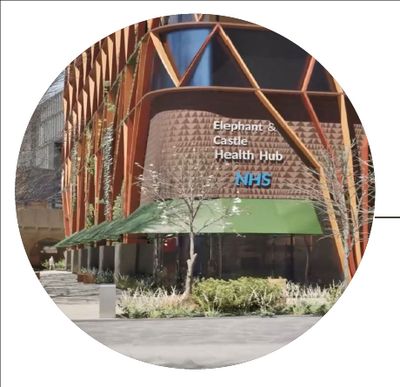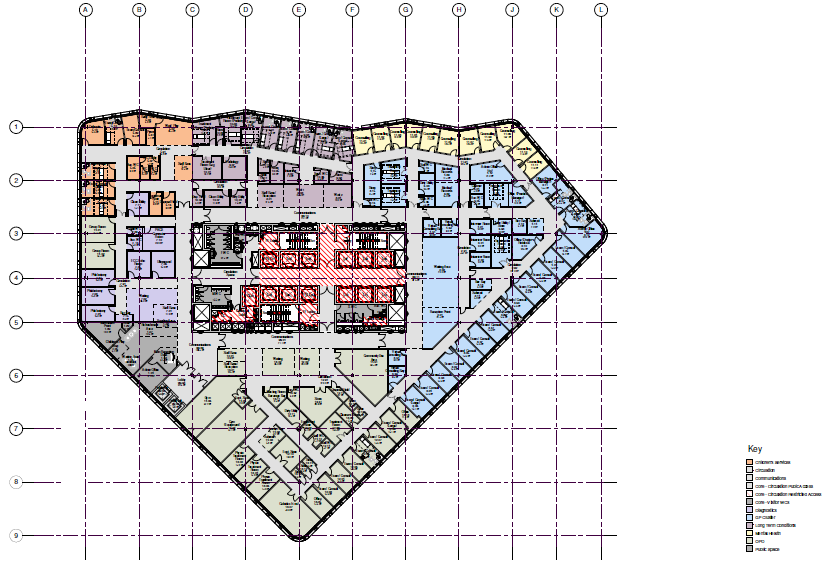
Elephant Park developer Lendlease is watering down its commitments to providing a health hub as part of its proposed office block on the final plot of Elephant Park, H1.
A draft s106 agreement between Lendlease and Southwark Council shows that Lendlease no longer want to commit to a 30-year lease, if the development goes ahead, but leave the length of the lease open to negotiations. Lendlease had previously expressed the intention of agreeing a 30-year lease, as noted in both the council report to the planning committee and a Memorandum of Understanding between Lendlease, Southwark and the NHS.
The draft agreement was lodged as part of the recent public inquiry, called after Lendlease appealed against the Council’s decision to reject their office block application in October 2022. Southwark Council and local campaign group Community Objectors H1 (which includes the 35% Campaign) have submitted their own versions of the s106 agreement to the inquiry, which both specify that the health hub lease should be for 30 years. Objectors had already unsuccessfully argued that even 30 years was too short a period.
The office block and health hub will only be built if Lendlease wins its appeal. A decision will be made by the inquiry inspector and is still awaited. The Inspector will also decide which version of the s106 will apply.
 "From Memorandum of Understanding between Lendlease, Southwark and the NHS, 09 Feb 2022"
"From Memorandum of Understanding between Lendlease, Southwark and the NHS, 09 Feb 2022"
How big will the health hub be?
The size of any eventual health hub is also in doubt. It would be provided instead of affordable workspace, which is what is usually required in developments of this kind, under Southwark’s planning rules. These say that 10% of the total workspace should be ‘affordable’ at a discounted market rent for 30 years. There is the option, though, for 'health services' to be provided as an 'alternative' in 'exceptional circumstances' and both Southwark and Lendlease prefer this for H1.
However, Lendlease does not propose to simply provide the same floorspace for the health hub as it would have done for the affordable workspace. Instead, it proposes a complicated formula where the health hub’s rent would be a determining factor in calculating its size. This is to avoid paying more for providing the health hub than for providing affordable workspace, but it might also mean that the hub is smaller than 10% of the total workspace.
Southwark Council go along with this approach in their version of the draft s106 agreement. The Community Objectors H1 (COH1) disagree and in their version say the health hub simply says that the health hub should be 10% of the affordable workspace.
What we say….
Lendlease should provide a health hub that is equal to 10% of workspace at a minimum 30-year lease, if it gets planning permission for its office block. Nor should it be at the expense of affordable workspace, which is needed for the many local traders that still have no affordable premises, as local charity Latin Elephant pointed out in their planning inquiry evidence.
Against this, Lendlease and Southwark say that the health hub is the preferred option, in place of any affordable workspace, because of the local need for a health facility. But allowing Lendlease flexibility on the size and the length of the lease puts their financial interest above the public need. If all parties agree that the health hub is so important, then it must be fully delivered. Lendlease should cover any increased cost entailed in the hub (as they appeared to be committed to, previously) and count it as a good investment, for the benefit of having a NHS facility right in the middle of what is, after all, their own development.
Southwark Law Centre's adds....
Lendlease wants to leave the length of the lease and the size of the health hub to the vagaries of negotiation. The cost of the health hub would be effectively capped by whatever the cost of the affordable workspace would be and the figures underlying this would be supplied by Lendlease. Jed Holloway of the Southwark Law Centre, who advised the COH1 objectors at the public inquiry, says ‘Any figures put forward by Lendlease would involve subjective estimates that would no doubt skew things in their favour. The Council would have the ability to review these figures, but they would likely lack the resources and the data needed to properly scrutinise them’.
 "Indicative health hub floor plan"
"Indicative health hub floor plan"
.....what's the future for Walworth GP surgeries?
Also, the future of the two local GP surgeries at Manor Place and Princess St must be also be taken into account. If they are replaced by a health hub, as the Memorandum of Understanding implies, we must avoid any possibility of losing the hub and GP facilities at the end of an unsatisfactorily short lease.
Finally, it appears that Southwark Council is again bending to Lendlease’s will; they allowed Lendlease to squeeze more homes into a smaller space on Elephant Park and then agreed in principle to an office block on H1, only rejecting it on size grounds. This all adds up to the lesson that developers always put their own interests first, a lesson Southwark should have learned by now.
NOTE - COH1 is comprised of local residents, including some who live on Elephant Park; the Walworth Society and the 35% Campaign. It was represented by barrister Charles Bishop of Landmark Chambers, the Public Interest Law Centre and the Southwark Law Centre’s Planning Voice Project. You can read more about the public inquiry here.